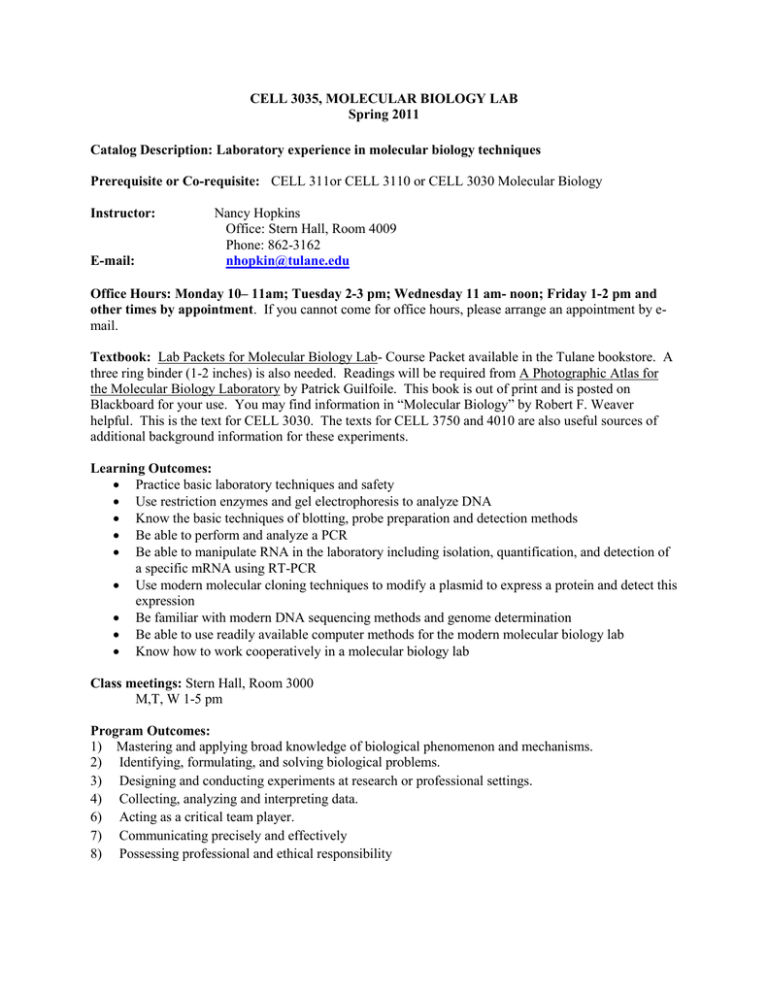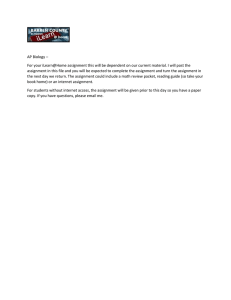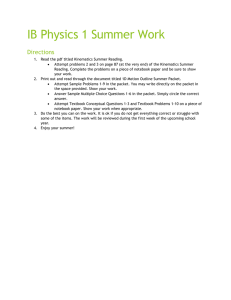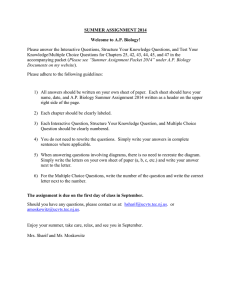CELL 3035, MOLECULAR BIOLOGY LAB Spring 2011
advertisement

CELL 3035, MOLECULAR BIOLOGY LAB Spring 2011 Catalog Description: Laboratory experience in molecular biology techniques Prerequisite or Co-requisite: CELL 311or CELL 3110 or CELL 3030 Molecular Biology Instructor: E-mail: Nancy Hopkins Office: Stern Hall, Room 4009 Phone: 862-3162 nhopkin@tulane.edu Office Hours: Monday 10– 11am; Tuesday 2-3 pm; Wednesday 11 am- noon; Friday 1-2 pm and other times by appointment. If you cannot come for office hours, please arrange an appointment by email. Textbook: Lab Packets for Molecular Biology Lab- Course Packet available in the Tulane bookstore. A three ring binder (1-2 inches) is also needed. Readings will be required from A Photographic Atlas for the Molecular Biology Laboratory by Patrick Guilfoile. This book is out of print and is posted on Blackboard for your use. You may find information in “Molecular Biology” by Robert F. Weaver helpful. This is the text for CELL 3030. The texts for CELL 3750 and 4010 are also useful sources of additional background information for these experiments. Learning Outcomes: Practice basic laboratory techniques and safety Use restriction enzymes and gel electrophoresis to analyze DNA Know the basic techniques of blotting, probe preparation and detection methods Be able to perform and analyze a PCR Be able to manipulate RNA in the laboratory including isolation, quantification, and detection of a specific mRNA using RT-PCR Use modern molecular cloning techniques to modify a plasmid to express a protein and detect this expression Be familiar with modern DNA sequencing methods and genome determination Be able to use readily available computer methods for the modern molecular biology lab Know how to work cooperatively in a molecular biology lab Class meetings: Stern Hall, Room 3000 M,T, W 1-5 pm Program Outcomes: 1) Mastering and applying broad knowledge of biological phenomenon and mechanisms. 2) Identifying, formulating, and solving biological problems. 3) Designing and conducting experiments at research or professional settings. 4) Collecting, analyzing and interpreting data. 6) Acting as a critical team player. 7) Communicating precisely and effectively 8) Possessing professional and ethical responsibility Program Objectives: To provide our students with broad knowledge in the cellular and molecular basis of life and the intelligence to apply molecular techniques to medical, technological and environmental issues. Students who graduate from the program will be fully successful in 1) pursuing further education in graduate school or professional school and 2) developing a career in a biomedical research field or pharmaceutical industries. Schedule Meeting 1 Date Sept 12,13,14 2* Sept 19,20,21 3A* 3B 4A Sept 26, 27, 28† Sept 27,28, 29 Oct 2, 3, 4‡ 4B* Oct 3, 4, 5 5* Oct 10, 11, 12 6 Oct 17, 18, 19 7A Oct 23,24,25‡ Plasmid Cultures 7B* Oct 24,25,26 8* 9 Oct 31, Nov 1,2 Nov 6,7,8 10A Nov 12,13,14‡ Quantitation of mRNA; Calculation of Transformation Efficiency; Isolation of Plasmid DNA Linker Based Mutagenesis; Preparation of Linker; Ligation Transformation with Ligated Plasmid ; RT-PCR EXAM 2 (Meetings 5-8) Plasmid Cultures 10B* Nov12,14,15 Isolating Plasmids Luciferase Assay; Computer Analysis Lab 12* Nov 28,29,30 13 Dec 5,6,7 Plasmid Prep Gel; RT-PCR gel; DNA Sequencing(Concepts only) Final Exam Experiment Introduction; Lab Safety’ Use of Equipment; Running a Gel Restriction Digest/ RFLP; Isolation of DNA for Probe RFLP Analysis- Southern Blotting; Labeling Probe DNA Complete Southern Blot Prehybridization and Hybridization o f Southern Blot Washing and Developing Southern Blot PCR; mRNA Isolation EXAM 1 (Meetings 1-4) PCR Gel; TransformationBlue/White Screening; Assignment Atlas Chapters 1 & 2; Lab Packet I Atlas Chapters 3 & 4; Lab Packet II Exercises 3 & 4 Atlas Chapter 4; Lab Packet IIExercises 5 & 6 Atlas Chapter 4; Lab Packet IIExercise 7 Atlas Chapter 4 Lab Packet IIExercise 8 Atlas Chapter 5 & 6; Lab Packet III Exercise 9 & 10 Atlas Chapter 5 & 7; Lab Packet IIIExercise 9 Procedure 3; Lab Packet IV- Exercise 12 Lab Packet IV; Exercise 13 Procedure 1 Atlas Chapter 6 & 8; Lab Packet IIIExercise 10, Procedure 2; Lab Packet IV- Exercise 13, Procedure 2 Atlas Chapters 9 & 10; Lab Packet IV-Exercise 14 Atlas Chapter 7 & 9; Lab Packet IVExercise 15; Lab Packet III- Exercise 11 Lab Packet IV- Exercise 16, Procedure 1 Atlas Chapters 8, 9; Lab Packet IV Exercise 16 Procedures 2 & 3; Lab Packet V- Exercise 17 Atlas Chapters 7, 9, 11; Lab Packet V- Exercise 18 *quiz † day after regular lab day before regular lab ‡ Course Organization: CELL 3035 Molecular Biology Laboratory is a one semester, one credit laboratory. This course is designed to introduce you to the basic techniques and principles used in a modern molecular biology lab. It is impossible to cover all the technology that is available to research scientists. The techniques you will learn are fundamental to molecular biology research and form a basis for understanding many more complex technologies. We will complete four projects in this course. Laboratories 3-8 compose a complete RFLP analysis with Southern blotting. Laboratories 9-11 introduce two PCR methods and demonstrate RNA isolation. Experiments 13-17 introduce cloning and experiments 18 and 19 deal with DNA sequencing. Each of these experiments has several parts and it will be necessary for you to be able to coordinate several tasks at the same time. ASSESSMENT & GRADING Two mid-term exams (35 points each) will be given over the course of the semester, plus a final exam (70 pts). Eight (8) scheduled quizzes (see meetings marked with an “*”) will be given, each worth 10 points. You will keep a notebook and will be given written assignments that will count for 120 points. The remaining 110 points will come from class participation as deemed by your TA and instructor. Your final grade will be based on a total of 450 points. Quizzes and exams will be based on theory and protocols found in the assignments and lectures and on interpretation of data. The notebook and participation grade will be based on attendance in the laboratory, documentation, interpretation and understanding of the experiments and results. Please note that there will be NO MAKE-UP LABS, EXAMS OR QUIZZES! It is imperative that you come to class prepared. You should read the experimental procedure in the lab manual and in handouts and the corresponding chapters in the Atlas. The citations in Weaver contain background material that will help you to understand the experiments. These citations are not exhaustive and you may find other material in that text that will be helpful to you. The weekly quizzes will cover both the material from the previous lab and questions (up to 5 pts) on the experiment for that week. You should read the laboratory procedure and the Atlas to be prepared for these questions. You will be required to keep a laboratory notebook. This notebook will be somewhat informal and kept like a research notebook. Part of the notebook will consist of the data and question sheets in your lab book. Your lab book and additional paper to record data should be placed in a three ring binder. You should date the entries and take notes complete enough that you and your TA can read them. Some examples of data that you will record are loading sequences for gels, photographs of gels and blots, etc. Tape and a 3-hole punch will be provided in the lab so that you will be able to easily add these items to you notebook. You may be given handouts on various procedures and information about reagents that we use which should be placed in your notebook. Your TAs will check the notebooks on a regular basis so they should be kept up to date. If the teaching assistants feel that you are coming to lab unprepared then they may give written prelab assignments as a part of your participation and notebook grades. The quizzes will be relatively short and will cover information that was previously covered (since the last quiz) as well as information pertaining to that day’s lab. The midterm will cover all of the material and labs that have been covered prior to that lab and the final will cover all of the material after the midterm. ALWAYS read the “Photographic Atlas Reference” cited for that day’s assignment. This is an excellent source of background information (think quiz, exams). Occasionally, handouts for the labs may be given the week before they are used especially when there is a change in the procedure from that written in the lab book. You should place those in your notebook and read them before you come to lab. Any handouts will also be posted on Blackboard. It is your responsibility to be sure that you have checked Blackboard for any additional information before lab and, therefore, before the quiz. Any handouts should be hole-punched and placed in your lab book. ATTENDANCE Attendance is mandatory and there are NO MAKEUP labs. You must be on time. Most of the labs will not require the entire four hour period if you are prepared and are attentive to the lab lecture. You will be working with a lab partner. You should plan your time and share the work. In the molecular biology lab, it is often necessary to plan ahead so that solutions and gels are ready when you need them. Also, often it is necessary to be able to monitor two tasks at the same time. Occasionally, you will need to come in on the day before the lab to prepare solutions or begin an experiment. Also, you will sometimes need to return the day after lab to look at a result or place materials in the refrigerator. If you must miss a lab, you should notify both Dr. Hopkins and your teaching assistant before the lab. This may be done by e-mail providing there is sufficient time for them to receive the e-mail. Otherwise you must call. If you are excused, you may obtain any data that you need from your lab partner. You should indicate in your notebook who collected the data. Use of data other than your own without permission of the instructor or TA is a violation of the Honor Code and failure to acknowledge the source of the data in your notebook is a violation of the Honor Code. This means that if your experiment fails and you are told to use data from another group, it is your responsibility to record this in your notebook. Additional written work may be required in order that the missed material is mastered. LAB MAINTANCE AND CLEANLINESS In order to complete the experiments in the lab period, many of the reagents will be made for you by the teaching assistants. Some reagents will be used on a continuing basis. The first time you that receive these reagents, you will be given storage conditions and told where the reagent is to be stored. You should label the container with your group number, day of lab meeting and both partners’ initials. Other reagents will be available at the side bench either in bulk or as aliquots. Expensive reagents such as enzymes, enzyme buffers and markers will be aliquotted for each lab group. Your TA will instruct you in proper handling and disposal for all reagents. You will be assigned a permanent lab station for the semester. Each group will have a set of equipment assigned to your group. Each group will be responsible for returning this equipment to its proper place at the end of each lab. Some equipment, i.e. centrifuges, will be shared by two groups at the same bench. Report any malfunctioning or broken equipment to your TA. You will be instructed as to the proper manner of disposal of reagents, gels, broken glass and plasticware for each lab. You are responsible for cleaning your area, storing reagents and equipment and disposing of waste. Failure to maintain your area and the common areas of the laboratory will result in loss of participation points. You are expected to conduct yourself in a professional manner in the lab. You are expected to listen to the lecture and to take notes. Students who are talking or moving about the room or attempting to do the experiment while the TAs are lecturing will be warned that the behavior is inappropriate and points will be deducted. If the behavior continues, the student will be dismissed from the lab and receive a zero for participation and for the lab notebook for that experiment. Students are not to use their cell phones in the lab. If you need to make a call or send a message, please step outside to do so. You should silence the phone during lab. Phones and PDAs must be turned OFF and put away during quizzes and exams. If you have you phone or PDA out and turned on during a quiz or an exam, you will receive a zero on the exam or quiz. Dress for lab is casual and comfortable. For safety reasons, you should not wear very short shorts or skirts, tank tops that are low cut or do not substantially cover the shoulder, baggy or very loose clothing or shirts that don’t cover the midriff area and upper chest completely. If your clothing is deemed inappropriate, you will be required to wear a lab coat that is buttoned. Closed toed shoes must be worn when labs use strong acids or bases. Long hair must be secured when open flame is used. BLACKBOARD We will be using Blackboard (http://tulane.edu/mytulane.cfm) for this course this semester. Check it often for announcements and information. Any handouts will be posted on Blackboard. Blackboard requires that you use your Tulane e-mail address. If you do not regularly check your Tulane account, forward the Tulane account to one you check regularly as the TAs and I will use e-mail to contact you. Please use your Tulane e-mail to communicate with the instructor and TAs. E-mail from many free e-mail sites are routinely filtered out as SPAM if the sender’s address is not in the account that is receiving it. We cannot be responsible if you do not receive an e-mail because your box is full or you did not check your e-mail. We cannot be responsible if we don’t receive an e-mail because you use an account other than your Tulane account or use the wrong address for us. E-mail can be sent to us directly from Blackboard if you have concerns. ACCOMMODATIONS FOR DISABILTIES If you need an accommodation in order to be successful in this class, it is your responsibility to obtain the proper paperwork for the Office of Disability Services in the Educational Resource Center. Please take care of this as soon as possible so that you are able to get the accommodations you might need from the beginning of class.


